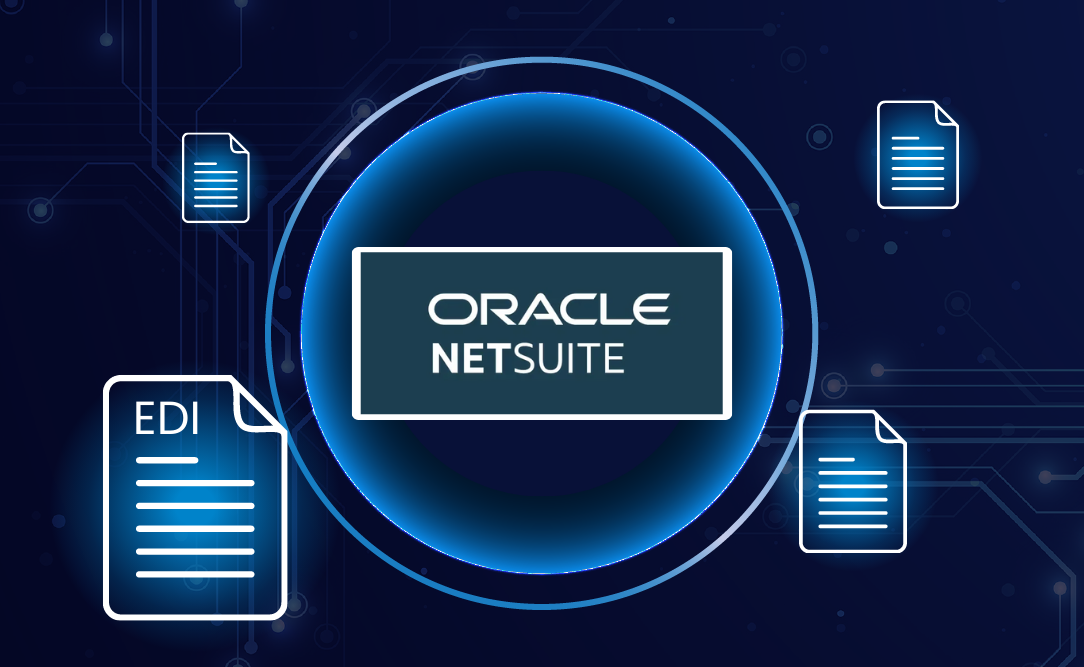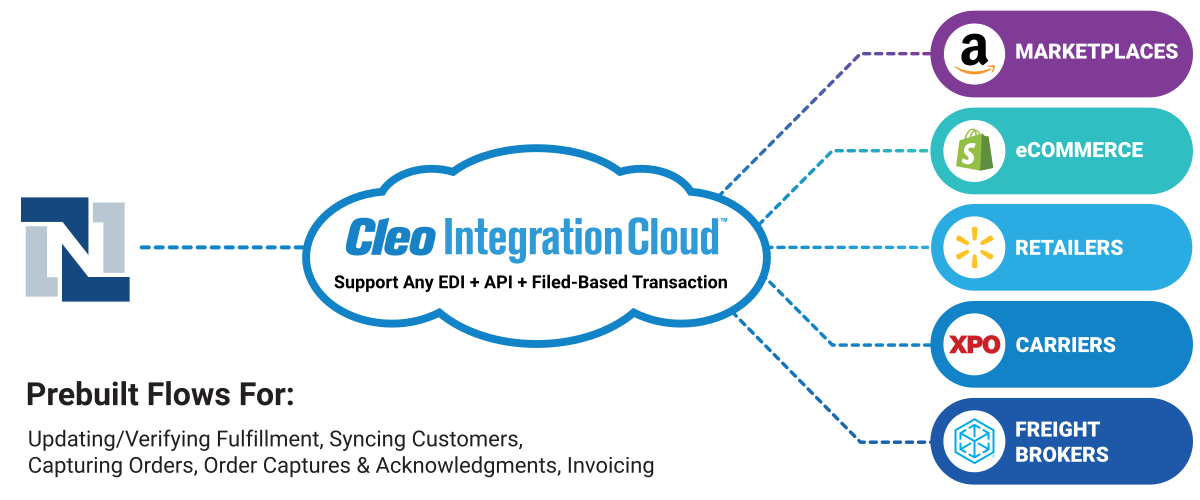NetSuite EDI Integration - Essentials & Best Practices Guide

As with any relationship, communication is vital. Especially in professional partnerships between businesses and their external partners, such as suppliers and vendors.
For businesses that utilize Oracle NetSuite ERP in connection with common eCommerce platforms, marketplaces, and trading partners, EDI integration between their ERP and their trading partners is a popular solution. It allows both organizations to secure and automate communication, enhancing the efficiency and accuracy of fulfillment processing.
However, Netsuite EDI integration can be challenging if an organization either picks the wrong solution for their needs, does not have the expertise available to help with implementation, or is newer to EDI integrations in general.
In this blog, we'll provide a comprehensive overview of EDI integrations with your NetSuite ERP, so you can build successful EDI connections between your digital ecosystem to your trading partners and start growing your business. Starting with the basics:
- What is EDI?
- Getting to Know Netsuite (Integration Options)
- What Types of Businesses Use NetSuite + EDI
- Why You Should Integrate NetSuite With Your EDI
- Top Benefits of NetSuite EDI Integration
- Best Practices When Integrating NetSuite to EDI
- Tips for a Reliable NetSuite EDI Integration
- How to Select the Right NetSuite EDI Integration Partner
- Get More from Your NetSuite EDI Implementation
- Why Trust Cleo to Integrate EDI With NetSuite?
What is EDI?
Electronic data interchange (EDI) is the digital exchange of information in a standardized format. To exchange and transfer data in the form of electronic documents such as purchase orders, or invoices and payments that a buyer and supplier might exchange in a typical EDI process.
By using this automated way of sharing data, companies can send important information in a universal standard format, so everyone understands it without any confusion.
Getting to Know NetSuite
For those unfamiliar with Oracle's NetSuite ERP solution, here is a quick summary of the main components of the system.
What Does NetSuite Do?
NetSuite is a comprehensive cloud-based system that enables companies to effectively manage critical business processes. It serves as an all-in-one solution for various functions, including enterprise resource planning (ERP), financials, customer relationship management (CRM), eCommerce, and inventory management.
All these different functions share a central database that is updated in real-time with information from each module. This makes it easy for users to collect and analyze data by only having to visit one, centralized location. Further, data silos are removed since employees across any department can access the information they need.
Is NetSuite an ERP?
NetSuite is one of the most common cloud-based ERP solutions worldwide, with more than 40,000 organizations using the platform. Used by companies of all sizes, it can accommodate a wide variety of currencies, languages, tax laws, and more. As an ERP system, it efficiently handles essential business functions like finance and accounting, inventory management, order management, and more.
NetSuite EDI Integration Options
NetSuite provides customizable EDI integrations tailored to your partners in retail, 3PL, transportation, etc. However, it lacks an inherent EDI capability. Typically, NetSuite EDI integrations are accomplished using an external EDI platform or EDI service, with integration options including:
REST APIs are often preferred due to the familiarity and preference of contemporary developers with this approach.
What Types of Businesses Use NetSuite + EDI
EDI benefits many different businesses, especially ones operating on a global scale or across different supply chains. This includes small businesses all the way to massive corporations, as well as those using NetSuite for retail and eCommerce. This is because EDI lets all integrated parties communicate effectively about factors that constantly fluctuate, such as inventory levels.
By enabling EDI functionalities between organizations and their partners, businesses can focus on perfecting their core practices and building seamless relationships within their supply chains, which ultimately serve their customers. These tactics can be employed by businesses aiming to expand their channels or markets and grow their company since they will be able to conduct business at a faster rate. Additionally, since many larger organizations require their trading partners to use EDI, companies that implement EDI will experience a greater number of business opportunities since they can conduct business with more trading partners.
Lastly, NetSuite is highly beneficial for organizations looking to improve their accounting operations. Integrating EDI with NetSuite's accounting software, which is part of the ERP platform, offers advantages in financial planning and management. This includes process automation and detailed performance insights.
Why You Should Integrate NetSuite With Your EDI
Businesses integrate their NetSuite ERP with an EDI solution to enable a centralized approach to communication and data sharing. Major retailers and businesses often require their suppliers to have EDI capabilities that allow for streamlined onboarding, so they can start conducting business with new organizations faster.
Similarly, when working with new vendors, EDI solutions with streamlined onboarding lets them quickly begin managing orders and notifications without a lengthy initial setup that may cause delays. NetSuite EDI integration can be remarkably straightforward, to the extent that even small businesses that use NetSuite have embraced EDI as their primary communication method.
Top Benefits of NetSuite EDI Integration
Integrating your NetSuite ERP with EDI capabilities offers numerous advantages. These include:
Fast and Efficient Communication
By using EDI integration to sync your NetSuite ERP with your vendors' platforms and channels, your business will experience swift information exchanges and data processing. This is largely due to the automation of business processing that no longer relies on human intervention.
Reduce Manual Entry and Minimize Errors
EDI integration in your NetSuite ERP automates critical processes such as data sharing, shipping updates, and order processing. This streamlined approach increases efficiency, reduces the risk of errors, and enables your teams to focus on essential tasks, boosting overall productivity.
Cost Savings
One of the most significant benefits for any business owner is cost savings. EDI integration eliminates the need for employees to manually process or write important documents, ensuring error-free operations and increased efficiency. By eliminating the need for labor-intensive manual tasks traditionally performed by employees, this allows businesses to reallocate their employees' time towards more valuable and profitable activities—ones that cannot be automated.
Enhanced Data Accuracy
By automating EDI transmission and seamlessly integrating it into your NetSuite ERP, manual data entry becomes a thing of the past. Automation eliminates manual data entry and the errors commonly associated with manual intervention, ensuring data accuracy and maintaining EDI compliance throughout your operations.
Accelerated Business Cycle Speed
EDI integration enables significant reductions in data processing time. With streamlined order-to-shipment cycles, your business can experience substantial time savings. The rapid exchange of EDI transactions in minutes instead of days translates to faster completion of business processes.
Improved Trading Partner Visibility
Properly executed EDI integration allows your business to focus on core activities. With accurate and automated data readily accessible within your NetSuite ERP, you gain valuable visibility into how your EDI partners impact your overall business. This visibility empowers you to make informed decisions and better understand the dynamics of your trading partner relationships.
When it comes to larger enterprises utilizing NetSuite, particularly in the retail or eCommerce sectors, implementing a robust EDI integration ensures consistent and reliable processes. Data is automatically processed and shared, providing easy access whenever crucial business decisions need to be made quickly. This helps optimize inventory levels, so a supplier's warehouse is never too full or empty, and retailers always have adequate inventory available.
Therefore, businesses can avoid express manufacturing and delivery fees, excess storage fees, and having surplus stock that never ends up selling; while simultaneously ensuring that retailers have adequate inventory on hand so a sale opportunity is never missed.
Lastly, by leveraging electronic data, such as invoices and shipment notifications, even greater savings are achieved by reducing the need for physical goods. This includes the reduction of paper, printer ink, office machines (fax, printer, etc.), postage fees, and overall administrative costs.
Best Practices When Integrating NetSuite to EDI
Understanding best practices when exploring NetSuite EDI integration solutions is critical in avoiding unnecessary service costs, scalability hurdles, and system compatibility issues. Here are key components of implementation that enterprises should look forward to:
1. Define Business Objectives First:
Allowing your business objectives to steer your integration needs is a foundational principle in effective technology deployment. Understand the specific business processes you aim to improve through integration. By letting business objectives take the lead, you pave a path toward smooth implementation and sustainable growth.
2. Understand NetSuite:
Have a solid understanding of how NetSuite works, including its data structures, workflows, and capabilities. This knowledge will help you design an efficient integration that maximizes fulfillment efficiency and order visibility.
3. Customization vs. Standardization:
Determine whether you need custom integration solutions or if you can leverage existing EDI connectors or plugins. Additionally, understand which methods offer flexible options that support your unique Netsuite integration needs. Considering the convenience of service options (ie. self-service, managed service, or a blend of both).
4. Data Mapping and Transformation:
Ensure proper data mapping between your EDI system and NetSuite. Data transformation might be necessary to align different data formats and structures.
5. Error Handling and Logging:
Establish a robust error-handling mechanism that can identify, log, and address integration errors promptly. Effective error management minimizes disruptions and smooths fulfillment processes.
6. Automated Workflows:
Design automated workflows to streamline processes. For instance, when an EDI order is received, an automated process should trigger in NetSuite to update inventory and initiate order fulfillment, effectively eliminating manual tasks.
7. Data Validation:
Implement data validation mechanisms to prevent incorrect or incomplete data from entering your systems. This helps maintain data accuracy and integrity.
8. Testing and QA:
Rigorously test your integration in a controlled environment before deploying it in production. Conduct testing for different scenarios and edge cases to ensure everything works as expected.
9. Monitoring and Maintenance:
Establish monitoring tools and practices to keep track of the integration's performance. Regularly review and update the integration as needed to accommodate changes in business processes or technology.
10. Security and Compliance:
Prioritize data security and compliance. Ensure that sensitive data is encrypted during transmission and stored securely. Additionally, comply with relevant industry standards and regulations.
11. Scalability:
Consider future scalability requirements. Ensure that your integration can handle increased data volumes and additional business partners as your operations expand.
12. Documentation:
Maintain comprehensive documentation of the integration process, including setup, configuration, data mapping, workflows, and troubleshooting steps. This documentation is valuable for ongoing developments and future improvements.
By harnessing the advantages of EDI integration into NetSuite, you can achieve enhanced data accuracy, accelerate business cycles, and gain valuable insights into your trading partners' ecosystem. All while being able to manage critical orders and integrations from a single place.
These best practices help you can maximize the benefits of integrating NetSuite with your EDI system while minimizing potential challenges and disruptions.
Get easy and direct answers to your questions about
NetSuite EDI integration from experts in the space.
No sales push, no obligations.
Tips for a Reliable NetSuite EDI Integration
To establish a successful integration between your NetSuite ERP and EDI capabilities, it is essential to implement an EDI integration solution as middleware. The middleware acts as a connector within your organization, linking applications and data. It also facilitates data exchange and sharing among users within the organization.
By utilizing a leading EDI integration solution as middleware, you should gain visibility and data sharing across all teams in your organization. Moreso, you should gain immediate and real-time access to a centralized and reliable source of truth for your NetSuite-integrated business.
How to Select the Right NetSuite EDI Integration Partner
Selecting the right NetSuite EDI integration partner is a crucial decision that can significantly impact the success of your integration project. Here are eight key factors to consider when choosing an integration partner:
Expertise and Experience
Look for a partner with extensive experience in NetSuite EDI integrations and B2B integrations. They should have a deep understanding of both NetSuite in general and managing EDI technologies, as well as a proven track record of successful implementations. Assess their expertise through certifications, client testimonials, case studies, and online review sites such as G2.
Customization and Scalability
Ensure that the integration partner can tailor the EDI solution to meet your unique business requirements, as well as meet your trading partners' EDI mandates. They should have the expertise to handle complex integration scenarios and provide scalable solutions that can grow with your business.
Proven Methodology
Inquire about the integration partner's methodology and project management approach. A structured methodology ensures a smooth and efficient implementation process. They should have clear timelines, milestones, and communication channels to keep you informed throughout the project.
Support and Training
Check if the integration partner provides ongoing support and training after the implementation. They should offer comprehensive training to educate your team on EDI functionality within NetSuite—whether through pre-recorded videos, written guides, live workshops, etc. Reliable support ensures that any issues or questions are promptly addressed, minimizing disruptions to your operations.
Integration Network
Evaluate the integration partner's network and relationships with EDI service providers. A well-connected partner can facilitate seamless connections with your trading partners, simplifying onboarding and enhancing communication across the supply chain.
Client References
Request client references or case studies from the integration partner. Contact their past or existing clients to gain insights into their experiences and satisfaction levels. This feedback will provide valuable information about the integration partner's reliability, responsiveness, and overall performance.
Future-Readiness
Consider the integration partner's commitment to staying updated with the latest NetSuite and EDI advancements. They should actively monitor and incorporate new features, upgrades, and industry best practices into their solutions. This ensures your EDI integration remains robust and adaptable to future business needs.
Integration Capabilities and Compatibility
Verify that the integration partner's solution is compatible with your specific NetSuite version and supports the EDI document formats and protocols required by your trading partners. Furthermore, evaluate their expertise in integrating with other business systems or applications that you currently use or may consider in the future.
By carefully assessing these factors, you can confidently select the right NetSuite EDI integration partner that aligns with your business goals, ensures a smooth implementation, and maximizes the value of your EDI integration.
Transferring data between us and customers is a breeze - there is no inbetween process. Directly from one server to Cleo Integration. No more hopping from one server to another to transfer the data between us and customers.
Berlinda Y.
IS Service Manager
Wholesale
Get More from Your NetSuite EDI Implementation
Don't settle for just any NetSuite EDI implementation provider. Unlock the full potential of your business operations by partnering with an experienced NetSuite EDI implementation provider that employs industry best practices. One that will help you leverage the latest and most advanced features and functionalities offered by NetSuite, streamline processes, improve efficiency, and gain a competitive edge.
A proactive implementation partner stays up to date with the latest advancements in both NetSuite and EDI technologies, allowing them to conduct routine product updates that keep their EDI solution at the forefront. Additionally, they keep you informed about new features, upgrades, and industry trends to ensure your EDI integration remains future-proof and aligned with evolving business and EDI requirements.
Why Trust Cleo to Integrate EDI With NetSuite?
At Cleo, we understand how essential EDI integration is when connecting your NetSuite ERP to trading partners. A solid EDI integration can launch a successful business relationship with trading partners for years to come, as well as create a more harmonious and fluid digital ecosystem. That's why more than 4,100 customers around the globe trust Cleo as their EDI system for their ecosystem integration needs.
With the help of our flagship product, Cleo Integration Cloud (CIC), your company can quickly set up EDI integrations with your NetSuite ERP, so you can successfully connect your digital ecosystem to your trading partners and start growing your business.
And with our team of integration experts on hand 24/7 around the globe, we are here to help guide you through the NetSuite EDI implementation process and answer any questions that arise. If your business requires additional support, our managed EDI services team can implement, monitor, and maintain EDI integrations on your behalf.
Your business can expect the following benefits with Cleo's NetSuite EDI integration solution:
● End-to-end visibility.
● Rapid trading partner onboarding.
● Flexible service offerings—self-service, managed services, or blended services.
● Quick error resolution.
● Business process automation.
● Scalability.
● User-friendly design.
● A wide variety of protocol support.
● …and more.
Cleo also offers NetSuite Connectors and Accelerators that make integrations easier than ever before.
What Is Cleo's NetSuite Application Connector?
Cleo's NetSuite integration connector connects to the NetSuite API to pull data from the NetSuite database. From there, users have plenty of options. For instance, they can create recurring business processes that are templatized, including procure-to-pay and order-to-cash, adding more integrations with NetSuite. Users can also automate any potential status change notifications, and initiate integration and other responses. The connector allows you to have the flexibility and agility you need to get things done the way that most benefit your company's bottom line.
Why Use Cleo's NetSuite Connector?
So, what exactly will a NetSuite Connector from Cleo do for your enterprise? Through Cleo, a NetSuite connector provides harmonious integration into your ERP application. The NetSuite connector also:
● Eliminates manual integration processes.
● Reduces custom coding to leverage APIs.
● Verify and transforms your data.
● Automates order-to-cash business flows to and from NetSuite.
● Syncs business process data to your NetSuite ERP.

It's no secret that the EDI and B2B data exchange process can be complex. The NetSuite connector supports these difficult processes, while many many other ERPs can't. By combining the NetSuite API power with B2B integration technology, enterprises gain a sizable integrated business solution. Additionally, a NetSuite connector powers your B2B processor and eliminates the need to manually handle any orders that arrive from customers using EDI.
Data transformation tools also allow you to connect application-to-application, such as ERP to CRM (e.g. NetSuite to Salesforce), or ERP to eCommerce integration (e.g. NetSuite to Shopify).
What Is Cleo's NetSuite Application Accelerator?
The Accelerator is an out-of-the-box B2B integration for Netsuite to EDI between a system of record (e.g. ERP, TMS, or WMS) and an application or trading partner (e.g. Amazon Marketplace, a retailer, or a customer).
With the NetSuite Accelerator, integration owners merely configure these complex B2B integrations with no coding required. The combination of Cleo and the NetSuite Accelerator enables every user in an organization to track the operational pulse of supply chain integrations. This is due to Cleo providing real-time, end-to-end visibility of every transaction, which enhances collaboration with external ecosystem entities.
Why Use Cleo's NetSuite Accelerator?
The benefits of Cleo's NetSuite Accelerator include:
● Prebuilt end-to-end business process logic for deploying common API and EDI-based supply chain integrations.
● Speeding time-to-revenue by quickly connecting to eCommerce stores, marketplaces, or EDI-based trading partners.
● No coding necessary.
● Rapidly expanding sales channels.
● End-to-end visibility of every transaction.

So when your company is looking for a leading NetSuite EDI integration solution, be sure to consider Cleo. Our dynamic team of business and technical experts possess more than 900+ years of combined integration experience and leads the way in implementing, customizing, and integrating ERP solutions, including NetSuite. We closely collaborate with our customers to transition their business processes to our innovative Cloud platform, delivering unparalleled levels of productivity and efficiency through their digital business.
As a business leader, the Cleo Integration Cloud helps me consolidate data from multiple sources quickly and cost-effectively. It also increases my team's efficiency by eliminating manual tasks through streamlined workflows.
Joseph H.
Cyber Security Analyst
Enterprise
Contact us today at sales@cleo.com or +1.815.282.7695 to leverage our expertise and start experiencing the advantages of EDI integration. And be sure to explore some of our educational resources through our resource library.

Watch a 3-Minute Demo Video orNetsuite EDI Integration Solutions

About Cleo
